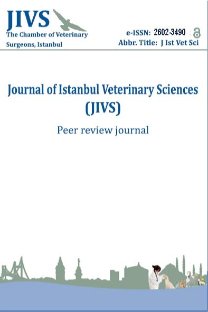The effect of Tarantula Cubensis extract applied in pre and postoperative period of canine mammary tumours
Background:
The purpose of the research was to investigate the effects of Tarantula
cubensis extract (Theranekron, 1:100 / D2, Richter Pharma, Austria) applied
during pre and postoperative period on canine mammary tumours. Methods : A total of 30 bitches between
the ages of 5-12 were used in the study. The breed distribution of the bitches
was observed as 21 Terriers, two Pekinese, two St. Bernards, one Setter, one
Danua, one German Shepherd, one Doberman and one Cocker. Group I consisted 20
bitches with mammary tumours and
subcutaneus injections of Tarantula cubensis extract were performed
preoperatively for three times at one week intervals with the dosage of 3 ml
per 10 kg. Between the days of 7th and 10th following the third injection,
complete unilateral mastectomy was performed and injections were repeated at
the 1st and 5th month of postoperative period. Histopathologic results of this
group revealed that 10 mammary tumours
were malignant and 10 was benign. Group I was compared to Group II consisted of 10 bitches with malignant tumours
which were treated by surgical excision alone. Results: In group I, no change was observed with palpation or
inspection after the first Tarantula cubensis extract injection. A week later
the second injection there was 10% regression in 10 cases. Benign tumours
(n=10) were observed to be hard and regressed 50% in the week following the 3rd
Tarantula cubensis extract injenction performed preoperatively while malignant
ones showed no regression but became hard. Reoccurence on the intact mammary
chain was not observed for a year of postoperative period in Group I. In Group II reoccurence was observed in six
bitches and pulmonary metastasis was determined in two. Conclusion: It was determined that Tarantula cubensis extract
applications in the bitch resulted in regression and hardness of benign mammary
tumours while only hardness was detected in malignant mammary tumours.
Postoperative injections can be performed in order to prevent the reoccurence.
___
- 1. Brearley, M.J.: Mammary gland tumours in the dog. In practice, 1989, 248-253.
- 2. Ciekot, P.: Client counseling for cancer: Considerations for making a professional and skillful presentation of treatment options, risks and therapeutic goals. Veterinary Clinics of North America-Small Animal Practice, 1995, 25, 19-33.
- 3. Gilson, S.D.: Clinical management of the regional lymph node. Veterinary Clinics of North America-Small Animal Practice, 1995, 25, 149-168.
- 4. Hampe, J.F., Misdorp, W.: Tumours and dysplasias of the mammary gland. Bulletin of World Health Organization., 1974, 50: 111-133.
- 5. Koch, H., Stein, M.: Konservative Behandlung von Neoplasmen der Milchdrüse des Hundes mit Theranekron. Praktische Tierarzt, 1980, 61, 424 – 430.
- 6. Macewen, E.G.: Spontaneus tumors in dogs and cats: Models for the study of cancer biology and treatment. Cancer and Metastasis Rewiews, 1990, 9, 125-136.
- 7. Morgan, R.V.: Handbook of Small Animal Practice. Second Edition, Churchill Livingstone, New York, 1997, 679-685.
- 8. Novosad, CA.: Principles of treatment for mammary gland tumors. Clin Tech Small Anim Pract., 2003, 18, 107-9.
- 9. Owen, L.N.: TNM Classification of Tumors in Domestic Animals. World Health Organization, Geneva, 1980.
- 10. Pingel, S.: Homeopathy. Basic aspects and principles of use in dermatology (in German). Hautarzt, 1992, 43, 475-482.
- 11. Zaninovic, P., Simcic, V. (1991): Epidemiology of mammary tumours in dogs. Z.B. Vet. Fak. Univ., Ljubljana, 1991, 1, 57-72.
- ISSN: 2602-3490
- Yayın Aralığı: Yılda 3 Sayı
- Başlangıç: 2007
- Yayıncı: İstanbul Veteriner Hekimler Odası
